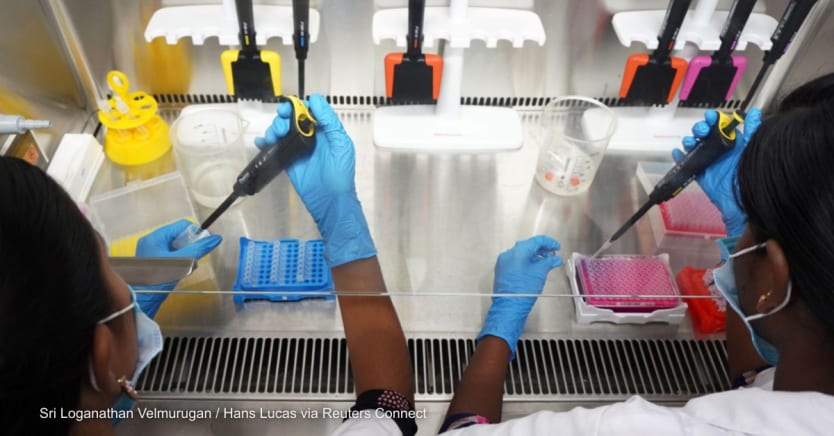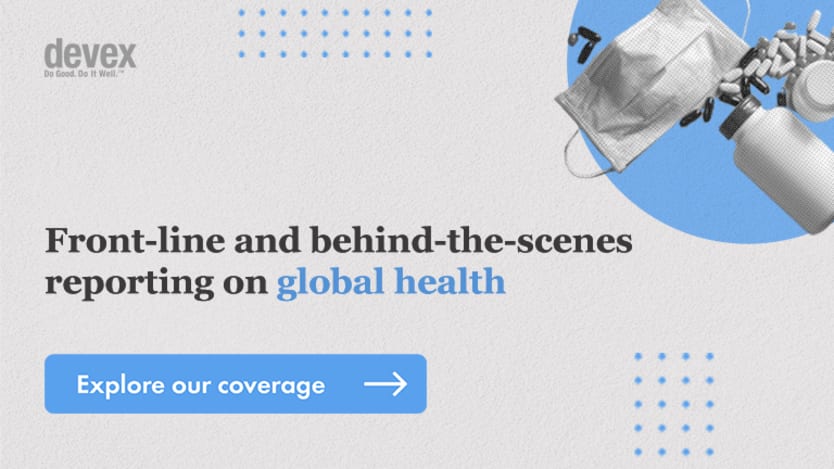
Days after South African officials publicly identified the new COVID-19 variant now known as omicron in November, high-income countries began shutting their doors, not only to South Africans, but to neighboring countries where the variant had not yet been detected. They maintained travel bans despite ongoing uncertainty about where omicron originated and even as it became clear that the variant was spreading outside southern Africa despite the restrictions.
The State of Global Health Security
Our special report, “The State of Global Health Security,” looked into, among other things, the future of WHO and what went wrong with pandemic preparedness measures.
South African officials, including Health Minister Dr. Joe Phaahla, responded by admonishing countries such as the United Kingdom and the United States; he said that “we must work together, not punish each other. Witch hunts don’t benefit anyone.”
Nevertheless, the bans remained in place for weeks, with the European Union only lifting its travel restrictions against eight southern African countries last week.
It was another perceived injustice that — alongside persistent disparities in access to COVID-19 vaccines and treatments — prompted calls for governments in the global south to exercise one of the few points of leverage they have left in pursuit of equity: to stop sharing information on the emergence of new COVID-19 strains, including their genomic sequences, or the spread of those that are known within their borders.
“They don’t have much other leverage, that’s the reality,” Victoria Fan, an associate professor of health policy at the University of Hawai'i at Mānoa told Devex. She recently co-wrote an article warning African countries to use what advantages they have to bargain for better treatment rather than relying on global solidarity to aid their COVID-19 response.
There is no instrument in place to actually enforce what information governments must report about the pathogens within their borders, let alone what countries are guaranteed if they do participate, such as access to vaccines or treatments that emerge from the data their researchers share.
Instead, the current system is propped up largely on various frameworks, goodwill, and the scientific community's recognition that global solidarity is needed to effectively halt the spread of disease.
If researchers choose to opt out of this system, it "would cause chaos," Lawrence Gostin, a global health law expert at Georgetown University, told Devex, even as he warned that there is little to prevent it from happening.
Indeed, it has happened before, most notably in late 2006, when Indonesian officials refused to continue sharing viral samples of the H5N1 bird flu with the World Health Organization’s influenza surveillance network. The decision was to protest the use of earlier samples without Indonesia’s permission, both by other researchers and by a drug company that was using them to manufacture a vaccine that the country would not have access to.
The incident prompted the creation of the Pandemic Influenza Preparedness Framework in 2011. The framework was designed to balance the commitment to share influenza viruses with human pandemic potential against access to vaccines and other pandemic-related supplies in low- and middle-income countries.
It is a narrow agreement, though, leaving out the vast majority of pathogens — including coronaviruses. While there are other agreements and protocols that encourage countries to share information on other infectious agents, they are inconsistent and largely unenforceable.
“We have a situation where there really is no viable global norm or agreement around what may be the two most fundamental issues in any pandemic, which is on the one hand scientific cooperation and sharing of knowledge and on the other equitable access to the benefits,” Gostin said.
Instead, experts have argued that the existing agreements, including the PIP Framework, codify the notion of viral sovereignty that Indonesia claimed. The concept grants country’s ownership of the viral samples within their borders, despite the fact that pathogens do not recognize those boundaries.
Viral sovereignty points to a path for governments — outraged at perceived misuse of their data, at inequitable distribution of vaccines or treatments that utilize that data, or at unjustified sanctions, such as travel restrictions — to restrict access to their pathogen information.
Taking that step, particularly in the midst of a global health crisis when governments have their greatest leverage, would be devastating, Gostin said. But he also acknowledged how the geopolitics of the current pandemic response might encourage governments to consider it.
The current system “just relies on countries and scientists turning the other cheek and doing the right thing, regardless of the consequences they face,” he said. “It’s deeply tragic that a country or a scientist would have to face that.” At the same time, “their only leverage is not to share and that’s a very bad solution.”
It is a path that researchers in South Africa were not willing to take, even though they recognized the potential consequences of reporting the omicron variant.
Dr. Richard Lessells, an infectious disease physician at the University of KwaZulu-Natal and part of the team of scientists in South Africa and Botswana that identified the omicron variant, said there was a recognition among the researchers that the findings might result in a travel ban or other restrictions. South African scientists publicly identified the beta variant in December 2020, only to see the country slapped with travel restrictions that took months to lift.
“We did know as we followed the same process of informing all of the relevant structures that the government would be transparent again and share that information with the public,” he said. “That means we would probably see travel bans being implemented.”
He said the importance of identifying the variant and giving countries a head start on preparing for its spread trumped the potential geopolitical consequences.
“We have a situation where there really is no viable global norm or agreement around what may be the two most fundamental issues in any pandemic.”
— Lawrence Gostin, global health law expert, Georgetown University“That’s been clear to us from the start, what our role as scientists is,” he said. “To share that information openly.”
But Lessells worries that researchers in some countries, after seeing what happened to South Africa and its neighbors, might be reluctant to share information in the future — whether about COVID-19’s spread and transformation, or about the potential emergence of other pathogens.
For Fan, it is not clear what else countries can do besides utilize the advantage they do have to compel a better trade-off between information and fairer treatment in the future.
“It’s not just feeding into some data repository that we never benefit from,” she said.
There are some systems in place, but they are primarily designed to address the specific concerns about credit and intellectual property that partially prompted Indonesia to stop sharing samples. The leading model is GISAID, an open-access database that requires researchers to credit the source of their information.
But even that model came under attack at the start of the pandemic, as some researchers pushed for completely open access to COVID-19 genomic sequencing with no restrictions at all. Those demands, experts said, only further destabilized an already fragile system for sharing some of the most consequential data that exists.
“The only good solution would be an international agreement that promotes scientific sharing by giving more assured access to the scientific benefits of that information and also compensation if there are any travel or trade bans put in place upon the country for doing the right thing,” Gostin said.
The current discussions around a global instrument to strengthen pandemic prevention, preparedness, and response offer a potential venue for striking such an agreement. But observers cautioned that it would require a degree of consensus that has yet to emerge in the current crisis.









